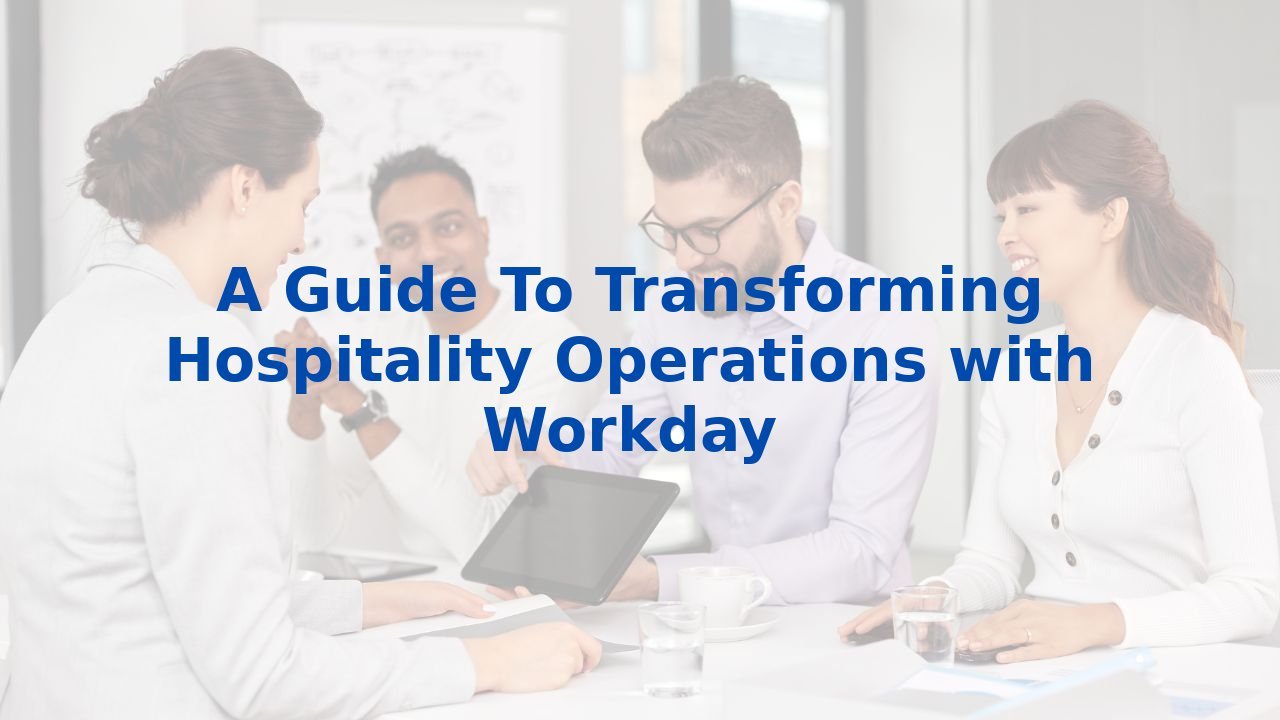A Guide To Transforming Hospitality Operations with Workday
A Guide To Transforming Hospitality Operations with Workday
The hospitality industry is on the brink of a transformative era, where technology is not just an add-on but a fundamental component that drives operational efficiency. At the heart of this transformation are new systems that blend advanced technology with everyday tasks. One such remarkable framework is Workday, a platform that streamlines processes and harnesses the power of artificial intelligence (AI). Here, we explore how these innovations can redefine operational workflows in hospitality and enhance overall efficiency.
Understanding Key Hospitality Operations
Hospitality operations encompass a myriad of processes—from front desk management and booking systems to workforce scheduling and financial administration. As competition intensifies, the demand for seamless service delivery and operational excellence becomes paramount. Traditional methods often fall short, leading to inefficiencies that can frustrate both employees and customers.
With the implementation of modern solutions like Workday, hospitality businesses can facilitate smoother operations through automation and real-time data management. Imagine a scenario where manual entries are replaced by intuitive interfaces that foresee staffing needs or predict peak times, freeing up human resources to focus on what truly matters: guest satisfaction.
The Role of AI in Enhancing Hospitality Operations
AI technologies resonate with hospitality operations in several impactful ways:
1. Streamlining Employee Management
Employee scheduling is notoriously complicated in the hospitality sector. Factors such as seasonality, special events, and unpredictable demand complicate the scheduling process. AI-driven systems can analyze historical data and adapt to changing conditions, ensuring optimal staff allocation at all times. This minimizes unnecessary labor costs while maximizing guest services efficiency.
2. Enhancing Guest Experience
AI solutions can also personalize the guest experience by analyzing preferences and past behaviors. Whether it’s suggesting customized packages or providing tailored services upon check-in, AI empowers staff to meet guest expectations proactively. The result is not just satisfied customers but loyal advocates.
3. Efficient Financial Management
The financial landscape in hospitality can be intricate, with numerous revenue streams and additional overheads. Automation through AI can streamline reporting processes, assisting financial teams with real-time insights. This enables decision-makers to identify profitable channels while minimizing waste, leading to healthier profit margins.
4. Inventory Control and Supply Chain Optimization
Finally, AI assists in managing inventory levels effectively. By predicting consumption patterns and enabling outlet managers to restock only when necessary, businesses can significantly reduce spoilage and excess spending. AI thus ensures that operational capabilities remain high while costs are kept in check.
Training Employees for AI: A Necessity, Not a Choice
While the insights gained from AI can significantly enhance efficiency, it’s paramount to recognize that the success of integrating such technology hinges on the workforce's ability to adapt. Training around AI is not just essential; it is an investment in your team's future. When employees are equipped with AI knowledge, they become more adept at leveraging these systems to elevate guest experiences and streamline operations.
Moreover, fostering a culture of continuous learning helps mitigate resistance to change. New technologies can be intimidating, and a well-structured training program can bridge that gap. Resources tailored for the hospitality sector, such as AI for Hospitality & Events, offer comprehensive courses that can walk your staff through the intricacies of AI applications relevant to their roles.
Unlocking the Future of Hospitality Operations
The integration of Workday and AI is not merely about keeping pace with the industry but setting a new standard for operational efficiency. These technologies are reshaping hospitality by allowing businesses to respond to customer needs instantaneously while empowering their workforce to operate at peak performance.
As we stand at the crossroads of traditional hospitality practices and emerging technology, the choice is clear: embrace transformation, invest in AI training, and watch as operational efficiency soars. Whether it’s encouraging staff to engage with training resources, or leveraging AI intelligence, your journey towards a more efficient and future-ready hospitality operation begins now.
“The future belongs to those who prepare for it today.”



